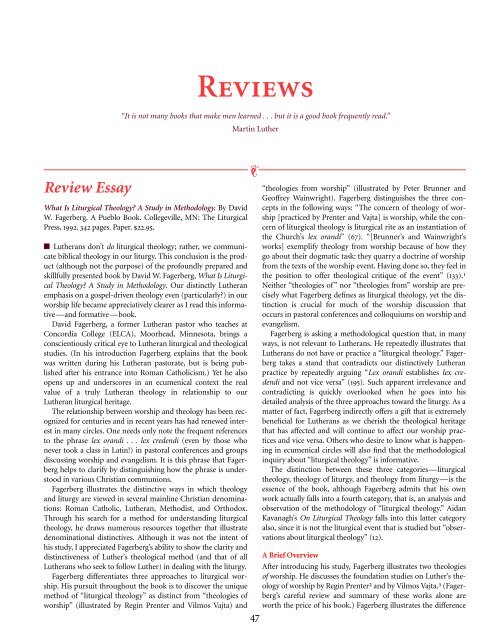05-4 Theology of the..
05-4 Theology of the..
05-4 Theology of the..
Create successful ePaper yourself
Turn your PDF publications into a flip-book with our unique Google optimized e-Paper software.
REVIEWS<br />
“It is not many books that make men learned . . . but it is a good book frequently read.”<br />
Martin Lu<strong>the</strong>r<br />
Review Essay<br />
What Is Liturgical <strong>Theology</strong> A Study in Methodology. By David<br />
W. Fagerberg. A Pueblo Book. Collegeville, MN: The Liturgical<br />
Press, 1992. 342 pages. Paper. $22.95.<br />
■ Lu<strong>the</strong>rans don’t do liturgical <strong>the</strong>ology; ra<strong>the</strong>r, we communicate<br />
biblical <strong>the</strong>ology in our liturgy. This conclusion is <strong>the</strong> product<br />
(although not <strong>the</strong> purpose) <strong>of</strong> <strong>the</strong> pr<strong>of</strong>oundly prepared and<br />
skillfully presented book by David W. Fagerberg, What Is Liturgical<br />
<strong>Theology</strong> A Study in Methodology. Our distinctly Lu<strong>the</strong>ran<br />
emphasis on a gospel-driven <strong>the</strong>ology even (particularly) in our<br />
worship life became appreciatively clearer as I read this informative—and<br />
formative—book.<br />
David Fagerberg, a former Lu<strong>the</strong>ran pastor who teaches at<br />
Concordia College (ELCA), Moorhead, Minnesota, brings a<br />
conscientiously critical eye to Lu<strong>the</strong>ran liturgical and <strong>the</strong>ological<br />
studies. (In his introduction Fagerberg explains that <strong>the</strong> book<br />
was written during his Lu<strong>the</strong>ran pastorate, but is being published<br />
after his entrance into Roman Catholicism.) Yet he also<br />
opens up and underscores in an ecumenical context <strong>the</strong> real<br />
value <strong>of</strong> a truly Lu<strong>the</strong>ran <strong>the</strong>ology in relationship to our<br />
Lu<strong>the</strong>ran liturgical heritage.<br />
The relationship between worship and <strong>the</strong>ology has been recognized<br />
for centuries and in recent years has had renewed interest<br />
in many circles. One needs only note <strong>the</strong> frequent references<br />
to <strong>the</strong> phrase lex orandi . . . lex credendi (even by those who<br />
never took a class in Latin!) in pastoral conferences and groups<br />
discussing worship and evangelism. It is this phrase that Fagerberg<br />
helps to clarify by distinguishing how <strong>the</strong> phrase is understood<br />
in various Christian communions.<br />
Fagerberg illustrates <strong>the</strong> distinctive ways in which <strong>the</strong>ology<br />
and liturgy are viewed in several mainline Christian denominations:<br />
Roman Catholic, Lu<strong>the</strong>ran, Methodist, and Orthodox.<br />
Through his search for a method for understanding liturgical<br />
<strong>the</strong>ology, he draws numerous resources toge<strong>the</strong>r that illustrate<br />
denominational distinctives. Although it was not <strong>the</strong> intent <strong>of</strong><br />
his study, I appreciated Fagerberg’s ability to show <strong>the</strong> clarity and<br />
distinctiveness <strong>of</strong> Lu<strong>the</strong>r’s <strong>the</strong>ological method (and that <strong>of</strong> all<br />
Lu<strong>the</strong>rans who seek to follow Lu<strong>the</strong>r) in dealing with <strong>the</strong> liturgy.<br />
Fagerberg differentiates three approaches to liturgical worship.<br />
His pursuit throughout <strong>the</strong> book is to discover <strong>the</strong> unique<br />
method <strong>of</strong> “liturgical <strong>the</strong>ology” as distinct from “<strong>the</strong>ologies <strong>of</strong><br />
worship” (illustrated by Regin Prenter and Vilmos Vajta) and<br />
47<br />
<br />
“<strong>the</strong>ologies from worship” (illustrated by Peter Brunner and<br />
Ge<strong>of</strong>frey Wainwright). Fagerberg distinguishes <strong>the</strong> three concepts<br />
in <strong>the</strong> following ways: “The concern <strong>of</strong> <strong>the</strong>ology <strong>of</strong> worship<br />
[practiced by Prenter and Vajta] is worship, while <strong>the</strong> concern<br />
<strong>of</strong> liturgical <strong>the</strong>ology is liturgical rite as an instantiation <strong>of</strong><br />
<strong>the</strong> Church’s lex orandi” (67). “[Brunner’s and Wainwright’s<br />
works] exemplify <strong>the</strong>ology from worship because <strong>of</strong> how <strong>the</strong>y<br />
go about <strong>the</strong>ir dogmatic task: <strong>the</strong>y quarry a doctrine <strong>of</strong> worship<br />
from <strong>the</strong> texts <strong>of</strong> <strong>the</strong> worship event. Having done so, <strong>the</strong>y feel in<br />
<strong>the</strong> position to <strong>of</strong>fer <strong>the</strong>ological critique <strong>of</strong> <strong>the</strong> event” (133).¹<br />
Nei<strong>the</strong>r “<strong>the</strong>ologies <strong>of</strong>” nor “<strong>the</strong>ologies from” worship are precisely<br />
what Fagerberg defines as liturgical <strong>the</strong>ology, yet <strong>the</strong> distinction<br />
is crucial for much <strong>of</strong> <strong>the</strong> worship discussion that<br />
occurs in pastoral conferences and colloquiums on worship and<br />
evangelism.<br />
Fagerberg is asking a methodological question that, in many<br />
ways, is not relevant to Lu<strong>the</strong>rans. He repeatedly illustrates that<br />
Lu<strong>the</strong>rans do not have or practice a “liturgical <strong>the</strong>ology.” Fagerberg<br />
takes a stand that contradicts our distinctively Lu<strong>the</strong>ran<br />
practice by repeatedly arguing “Lex orandi establishes lex credendi<br />
and not vice versa” (195). Such apparent irrelevance and<br />
contradicting is quickly overlooked when he goes into his<br />
detailed analysis <strong>of</strong> <strong>the</strong> three approaches toward <strong>the</strong> liturgy. As a<br />
matter <strong>of</strong> fact, Fagerberg indirectly <strong>of</strong>fers a gift that is extremely<br />
beneficial for Lu<strong>the</strong>rans as we cherish <strong>the</strong> <strong>the</strong>ological heritage<br />
that has affected and will continue to affect our worship practices<br />
and vice versa. O<strong>the</strong>rs who desire to know what is happening<br />
in ecumenical circles will also find that <strong>the</strong> methodological<br />
inquiry about “liturgical <strong>the</strong>ology” is informative.<br />
The distinction between <strong>the</strong>se three categories—liturgical<br />
<strong>the</strong>ology, <strong>the</strong>ology <strong>of</strong> liturgy, and <strong>the</strong>ology from liturgy—is <strong>the</strong><br />
essence <strong>of</strong> <strong>the</strong> book, although Fagerberg admits that his own<br />
work actually falls into a fourth category, that is, an analysis and<br />
observation <strong>of</strong> <strong>the</strong> methodology <strong>of</strong> “liturgical <strong>the</strong>ology.” Aidan<br />
Kavanagh’s On Liturgical <strong>Theology</strong> falls into this latter category<br />
also, since it is not <strong>the</strong> liturgical event that is studied but “observations<br />
about liturgical <strong>the</strong>ology” (12).<br />
A Brief Overview<br />
After introducing his study, Fagerberg illustrates two <strong>the</strong>ologies<br />
<strong>of</strong> worship. He discusses <strong>the</strong> foundation studies on Lu<strong>the</strong>r’s <strong>the</strong>ology<br />
<strong>of</strong> worship by Regin Prenter² and by Vilmos Vajta.³ (Fagerberg’s<br />
careful review and summary <strong>of</strong> <strong>the</strong>se works alone are<br />
worth <strong>the</strong> price <strong>of</strong> his book.) Fagerberg illustrates <strong>the</strong> difference
















